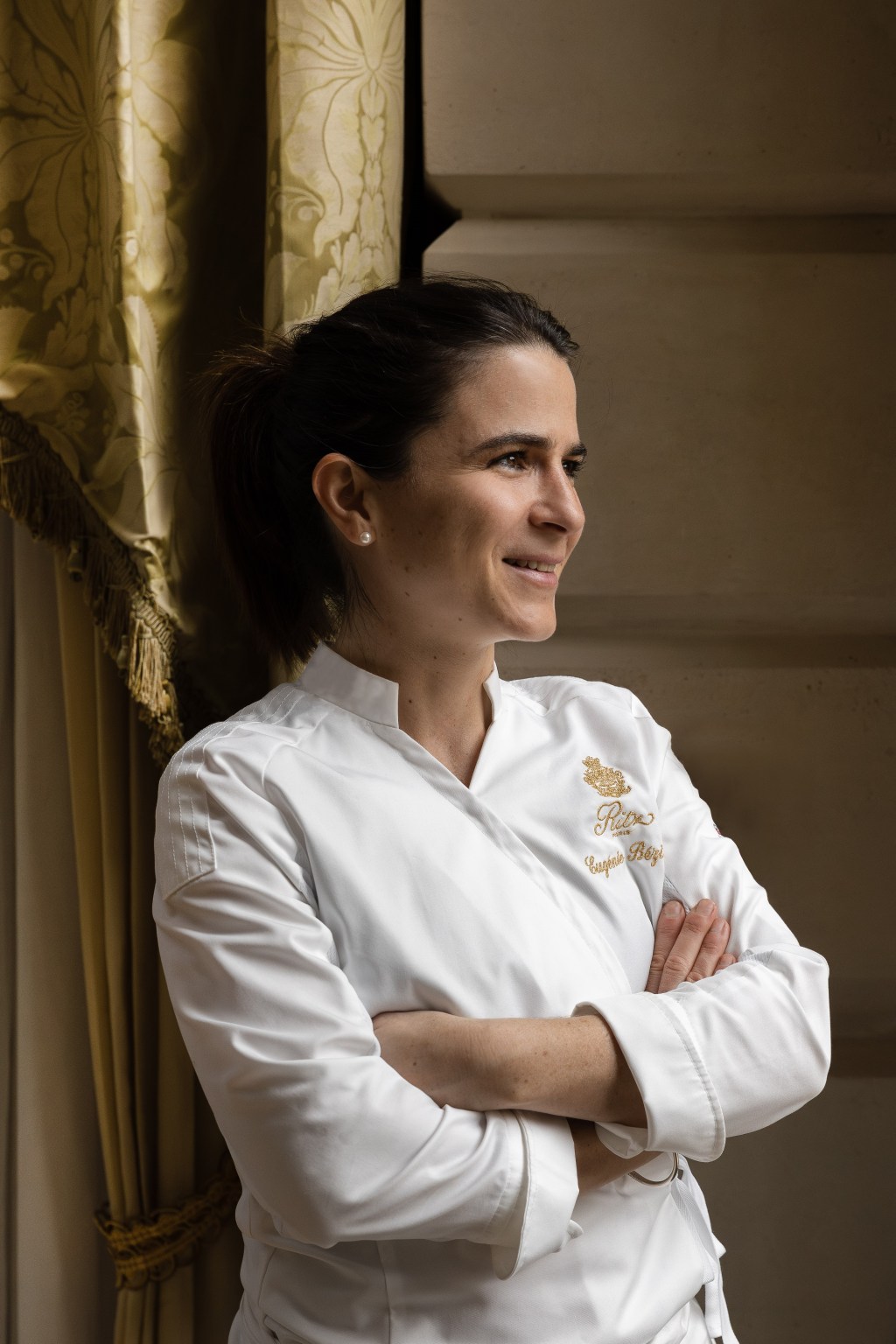Ask Eugénie Béziat her favorite dishes and she’ll tell you it’s a coin-toss between Chicken Yassa and a plate of al-dente pasta.
It’s less of a stretch than it sounds if one considers that the 40-year-old French chef now at the helm of the Ritz Paris’ Espadon restaurant spent the first 18 years of her life in Central and Western Africa, where her family of Italian and Spanish descent has been established for generations.
“With this new Espadon, our goal is awakening the senses with new flavors, spices and condiments because this cuisine is about emotions and travel,” says the hotel’s general manager Laurent Herschbach. “In the space of a dinner, you’re transported into another universe.”
Through a five- or eight-course tasting menu, Béziat indeed takes diners on a journey that meanders from her birthplace in Libreville, Gabon, through the heady heights of Michelin-starred gastronomy without missing a beat.
Along the way are ingredients such as brede mafane, a flowering herb reputed for its tingling mouthfeel; kororima seed reminiscent of green cardamom’s lemony facets; brousse cheese from Corsica, and a host of vegetables grown in the Île-de-France region around Paris.
Oh, and there’s even what’s in season in the hotel’s rooftop herb garden on Place Vendôme.
Though many of these products hail come from the four corners of the world and she is steeped in flavors experienced in Central and Western Africa, don’t use the word fusion to describe what she’s doing at Espadon.

“This is French gastronomic cuisine. Personal experiences, this past in Africa are a source of inspiration that lead me to work on flavors, spices, technical approaches,” she says.
Take the poultry dish that is one of the stars of the menu. “My father, who was born in Senegal, would often make Chicken Yassa when his best friends came round for dinner,” Béziat recalls.
To make this “highly addictive” popular simmered dish in sauce with as many recipes as there are families, what one needs is chicken, onion and a touch of acidity brought on by lemon and vinegar, she explains.
Béziat searched for the last farmer raising Houdan chickens, a traditional French breed considered one of the finest in the 19th century but that was near abandoned.
Next, the onion — “a food so simple and popular that is in nearly every cuisine in the world,” she remarks. The ones she uses are grown by the hotel in its kitchen garden, located 25 kilometers away from Paris in the Versailles plains and which supplies all the produce used at the hotel.
Matured to lose its sulfuric notes, the onion is then cooked in a hand-sculpted crust of red clay that evokes the soil of the South of France but the iron-rich laterite one in Africa to develop “very suave, very soft balsamic notes.”
Further gastronomic legerdemain involves roasting the chicken carcasses before turning them into glossy jus and a citrus butter, among other steps. The final impression is reinforced by a bite-sized tartlet with a stuffing of herbs and the legs of the roasted pullets.
Another striking example is the “lobster, cassava, bissap” dish, where hibiscus flower infusion she “used to gobble after school as ice lollies bought from street vendors” becomes the key ingredient in a sauce that completes a Brittany lobster cooked on the barbecue and served with cassava semolina.
A “mischievous bisque” adds more of that gourmand, moreish note that characterizes what she serves, be it a reinterpretation of the Bloody Mary cocktail as an amuse-bouche on a spoon, or the crunchy chocolate soufflé courtesy of the Ritz’s head pastry chef François Perret.
The daughter of epicurean parents, Béziat was “always fascinated by this art of alchemy” of bringing flavors together but did not initially set her cap for gastronomy.
Born in the Gabonese capital, the future chef did her primary education in Pointe-Noir in Congo, before returning to Libreville. For her final years of high school, she lived Abidjan in Côte d’Ivoire, where she passed her literary baccalaureate before heading to the southern French city of Toulouse at age 18 to pursue a degree in applied foreign languages.
Were it not for a dinner at the bistronomic restaurant of Michelin-starred chef Hélène Darroze, she might have continued on her literary track.
That dinner was “a gustative shock” for her 20-year-old self, she recalls, describing the acidity of a Granny Smith apple contrasting with the iodized flavor of an oyster as “a revelation” that made her realize this was her calling.
Exit English and German literature in favor of a two-year course on hospitality and catering. Then she cut her teeth through successive long-term experiences at Michelin-starred restaurants including Les Prés d’Eugénie with Michel Guérard, Michel Sarran’s eponymous establishment and La Roya in Corsica, with Yann Le Scavarec.
The year 2018 saw her go at it solo, given carte blanche to revamp the traditional French fare of La Flibuste, a family-owned restaurant in Villeneuve Loubet, a town bordering the Mediterranean Sea that is coincidentally the hometown of culinary legend Auguste Escoffier.
“When I’m looking for inspiration, I go deep inside myself, in my memories. I often say that when you want to go further in cooking, it’s a real introspection,” says the chef, who says her cuisine hinges on recollections of her childhood and adolescence as much as the gastronomic French traditions transmitted by the chefs she worked under.

The approach paid off: within 18 months, Béziat had a Michelin star — and was on the Ritz Paris’ radar.
A meal at La Flibuste was “a true discovery, a French gastronomic cuisine with Mediterranean and African inspirations, open on the world in terms of techniques, culture and produce,” recalls Herschbach.
Her fearless approach and precise execution slotted in with the palace hotel’s desire for “a young ambitious profile, with an authentic personality, confident and eager to create contemporary cuisine in a magnificent setting,” given that the hotel wanted to approach this new era of Espadon as an opening in its own right, rather than a reopening.
“It has its history — a beautiful heritage that we wanted to preserve in the name — but one of the values of our house is to constantly reinvent ourselves,” Herschbach says.
One thing the hotel’s never moving on from is founder César Ritz’s desire to make guests feel right at home in his establishment, continues the executive. And that’s something Béziat also wanted.
Today’s 30-seat Espadon was imagined as “a dining room where guests will be right at home, with an open kitchen behind a glass panel,” according to the hotel executive.
Early into her tenure, made official in April 2022, the restaurant’s longstanding location in the Vendôme wing of the hotel felt like a mismatch for her vision of “a more intimate setting.”
The restaurant returned to its original home on the Rue Cambon side, where it was first created on 1956, with the addition of a 2,000-square-foot outdoor dining area when the weather permits. Diners can now see Béziat and 10-strong kitchen brigade working in the open kitchen, separated only by vast windowpanes.

Also providing a satisfyingly domestic feel are plush carpets and velvet seats, a Bohemian crystal chandelier and the Astier de Villatte tableware, especially developed with the Parisian home goods brand.
But Herschbach stresses that the spirit of the Ritz was also about creating surprise and “thinking about tomorrow’s guest” are paramount to the Ritz Paris vision of hospitality.
One such surprise is beverage pairings. There’s of course wines, a challenge brilliantly undertaken by head sommelier Florian Guilloteau, who matched Béziat’s chiseled recipes with the likes of a 2014 Schoenenbourg Grand Cru vintage from the Alsace region, a 2007 Nuits-Saint-Georges from the Domaine Faiveley or Zacapa XO special reserve rhum to match with an oyster-based dish, the poultry or the chocolate soufflé.
But there will be the possibility to sample a pairing with drinks — alcoholic and not — ranging from spirits to infused waters, and a completely alcohol-free proposal still under development by Béziat, Guilloteau and Ritz Bar head barman Romain de Courcy.
Yet, while Béziat is the solar presence around which the new era of Espadon revolves, she is adamant that her cuisine wouldn’t happen without the many hands and hearts involved in the adventure.
Take the collaborator-of-sorts whose spirit followed her from Villeneuve Loubet: Escoffier.
“This passion he had for flowers really spoke to me,” she says, pointing out the vestibule draped in sculpted rhubarb leaves. “Did you know he wrote a book about sculpted wax flowers?”

She too has a passion for plants, evidenced in her liberal use of essences, spices and all kinds of aromatic plants. So important are they to Béziat’s repertoire that the first thing she asked was for her personal favorite, brede mafane, to be planted in the Ritz’s vegetable patch.
Each of her recipes is a journey and as she writes in the introduction to the Espadon’s menu, “in our travels, we’ll cross paths with those who live for and by their terroir, a source of infinite inspiration.”
That may be the real star ingredient in her cuisine. “Behind all these products, there’s the need to connect — without that, there’s nothing, no soul,” she says. “I couldn’t work that way.”
Cue the menu’s acknowledgements to “Laurent, the last farmer of Houdan’s beautiful and rare star pullets, raised just for [Espadon],” “Monsieur Duperier, duck farmer” or “Delphyne, who always brings [her] vanilla from Madagascar.”
“Hand in hand,” Béziat concludes.



